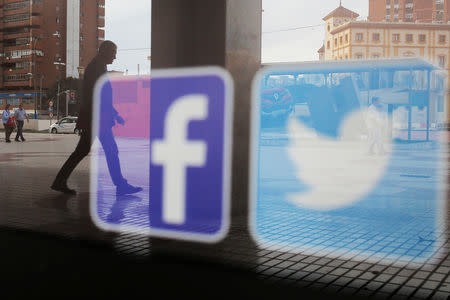Facebook and Twitter remove hundreds of accounts linked to Russia and Iran

Facebook and Twitter have purged accounts linked to Russia and Iran due to manipulating and inauthentic posts.
Mark Zuckerberg confirmed that more than 650 Facebook groups and pages have been suspended or removed after they were found to be ‘misleading’.
The social network confirmed that multiple accounts showed ‘inauthentic behaviour’ linked to Iranian and Russian campaigns that had spanned ‘many months’.
Although Facebook’s investigation, originally launched in 2016, is ongoing the site also said the campaign looked to be targeting users on varied internet services in the UK, US, the Middle East, Latin America.
And 284 Twitter accounts with apparent links to Iran have been suspended.

In a statement, Facebook said: ‘We ban this kind of behaviour because we want people to be able to trust the connects they make.”
Facebook also confirmed that it measures how trustworthy users are when they report fake news posts, as it attempts to tackle misinformation across the social network.
Users are able to flag up posts they think may be fake on Facebook, which are sent to a team of fact-checkers.
In a bid to help them sift through the reports more effectively, the tech giant has implemented a process whereby it can weigh up how reliable some users are based on previous feedback they have provided.
MOST POPULAR STORIES ON YAHOO UK TODAY
Why lazy people might be less likely to face extinction, according to science
Predatory sex abuser, 67, jailed for committing 200 sex assaults on two victims
Trump facing ‘serious questions’ after ex-lawyer claims President ‘directed’ hush money
Scottish chip shop releases ‘Crunchy Box’ most unhealthy takeaway ever
Cruise passenger rescued after 10 hours at sea branded a ‘stupid woman’
This means that someone who correctly reports fake news may be deemed more trustworthy than someone who has been found to be falsely flagging up posts as fake news.
The social network has not specified how it carries out these calculations, but disputed claims first published in the Washington Post that it uses a zero to one rating scale to determine a member’s level of trust, saying that it has no unified score.
“The idea that we have a centralised ‘reputation’ score for people that use Facebook is just plain wrong and the headline in the Washington Post is misleading,” a spokesman said.
“What we’re actually doing: We developed a process to protect against people indiscriminately flagging news as fake and attempting to game the system.
“The reason we do this is to make sure that our fight against misinformation is as effective as possible.”

